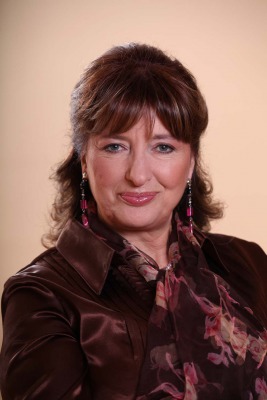BRANKA RADOVIC
Dr Branka Radovic was born in Cetinje. At the beginning, she graduated from the Department for Yugoslav and World Literature from Philology Faculty in Belgrade in 1973 and then also from The Faculty of Music Art in Belgrade in 1974. She won her master’s degree from the Department for Serbian History of Music in 1988 and then got her doctor’s degree from Philology Faculty at the Department for Serbian Literature in 1999.
She carried out her long-lasting pedagogical activity at Music school „Mokranjac“ in Belgrade and she was its headmaster since 1995 till 1999. She worked at several different faculties as a Professor of music history. Now, she is a Full Professor of FILUM in Kragujevac. She was the Dean of this university institution since 2004-2006. She started critic activity very early for the Third Program of Radio Belgrade, and then in daily newspapers „Borba“ and „Politika“. More than twenty years, she is the music critic for „Politika“, specially dedicating her attention to the opera. For ten years, she was The Editor-in-Chief in „Pro Musica“ review (1989-1999), a collaborator of numerous music reviews, a text writer and a scientific writer and these works are presented in this country and abroad.
Her first book is „A Short History of Music“ (Association of Music Pedagogists of Serbia, 1992), then follows „Music Stage Works of Nikola Hercigonja“ (Association of Composers of Montenegro, 2000), „The Elegance of Stagger“, Hristic’s “Twilight”, (SNP Novi Sad, 2000), Njegoš and Music Institution for textbooks and teaching aids, 2001), Summa Xeniana, monography on Ksenija Zecevic, (Belef centre, 2007), Monography on the Pianist Tomislav Stanic (Soul Workshop), „Score” a study of Herman Hesse’s music novels.
An intensive social activity in numerous commissions (Special recognitions from Ministry of Culture), juries (October Award, April Award) in governing boards of many institutions (Sava Centre, The National Theatre) run parallel with her professional activities.
She has been a selector for “Mokranjac Days” since 2007 and is considered one of the best experts of opera art with us. She speaks French, Italian and makes good use of English.
SPEACH OF THE PRESIDENT
Coming to be at the head of Opera and Theatre Madlenianum, I wanted to fulfill a part of my dreams. They are, first of all, opera. Since I have been engaged in opera critic, in opera as genre in all its aspects, music critic, texts, scientific works, from writing about foreign opera, with special reference to our, domestic opera, I have finally an opportunity to become acquainted with the process of creating of stage musical works even from the other side, namely from its very creation and presentation to the audience. That process of a creation of a performance is as innovative, exciting and often dramatic, as might be the real result which is presented to the audience.
I thought that, after decades of experience in watching and listening to operas, on our and foreign scenes, as well as writing about them, the moment of confrontation with all elements of opera art arrived.
On the other hand, my engagement with literature, which has lasted since my diploma examination at the Faculty of Philology, was never really explicated, except in my doctor’s theses in which I occupied myself with the connections of literature and music. Anyhow, that was actually the topic of a great number of my studies and works from the field of musicology and comparative art. Drama art has always been very close to me, as not only is it close to the reader and a theatregoer, but also because of the connection of different arts all of which are also present in an opera.
These are my personal reasons, but let me mention others arising from the aspect of a complex institution such as is Madlenianum. What does a theatre such as this one need, what can it stage and what calls for much more time, funds….?
The first task I would like to set to myself is a creation of entirety of drama and musical-stage events and production. This, first of all, refers to bringing the ballet back to the scene of Madlenianum and the help to keep and develop that fragile and noble art in this country. This is a very susceptible and important task to which, at the first moment, I would like to give my full attention and priority. Two ballet performances, one for the spring and the other for the autumn, have been planned for 2011. Talks with the authors and choreographers are being underway in a very serious and responsible way. The whole current repertoire, Donizetti’s Rita and Ibert’s Angelique, which have been recently staged, together with Ivan Jevtic’s Mandragola, are the whole current opera repertoire. We should add to this the musical Les Miserables which has already charmed the audience. I would like a new opera production during the next year as well as another one that will be performed by young singers with the newly founded Youth Club.
Drama repertoire would be enlarged and enriched by the production of Breakfast at Tiffany’s, envisaged for the spring.
The Society of Madlenianum Opera friends, Belgrade would, during this season, include into their activities the the Youth Club which will receive free young singers, conductors, directors and other protagonists of an opera performance and they would, together with experienced artists, as their tutors and professors, try to show their abilities in concerts and on stage events within the parent house.
A certain number of great ideas is still being considered but they are waiting to be definitely formed.
Dr. Branka Radovic

